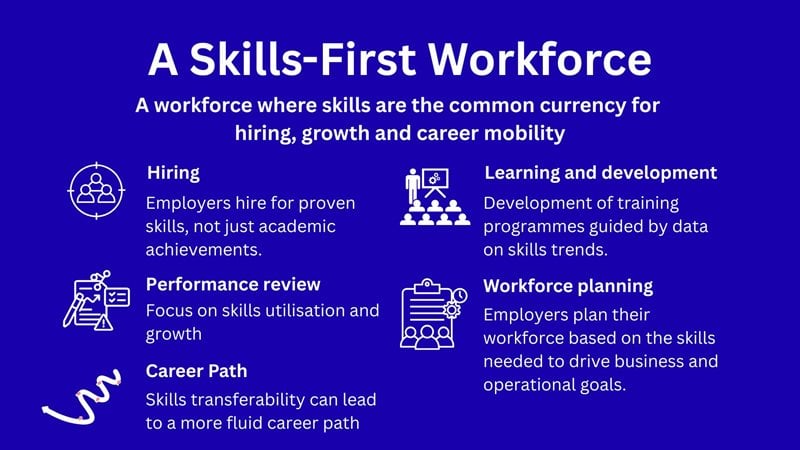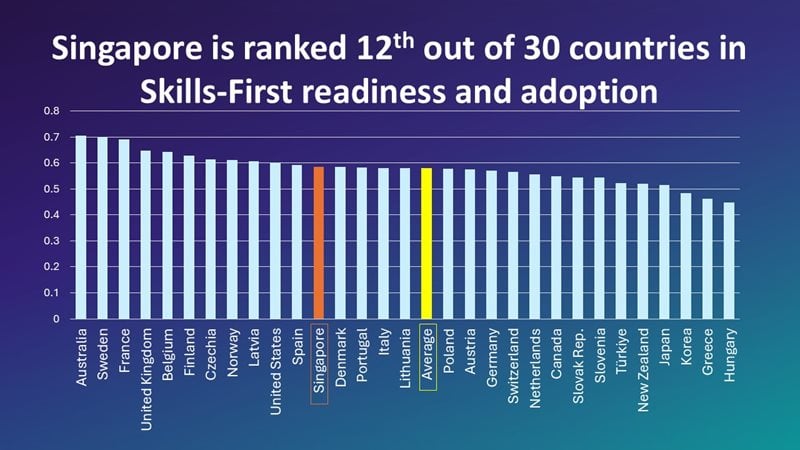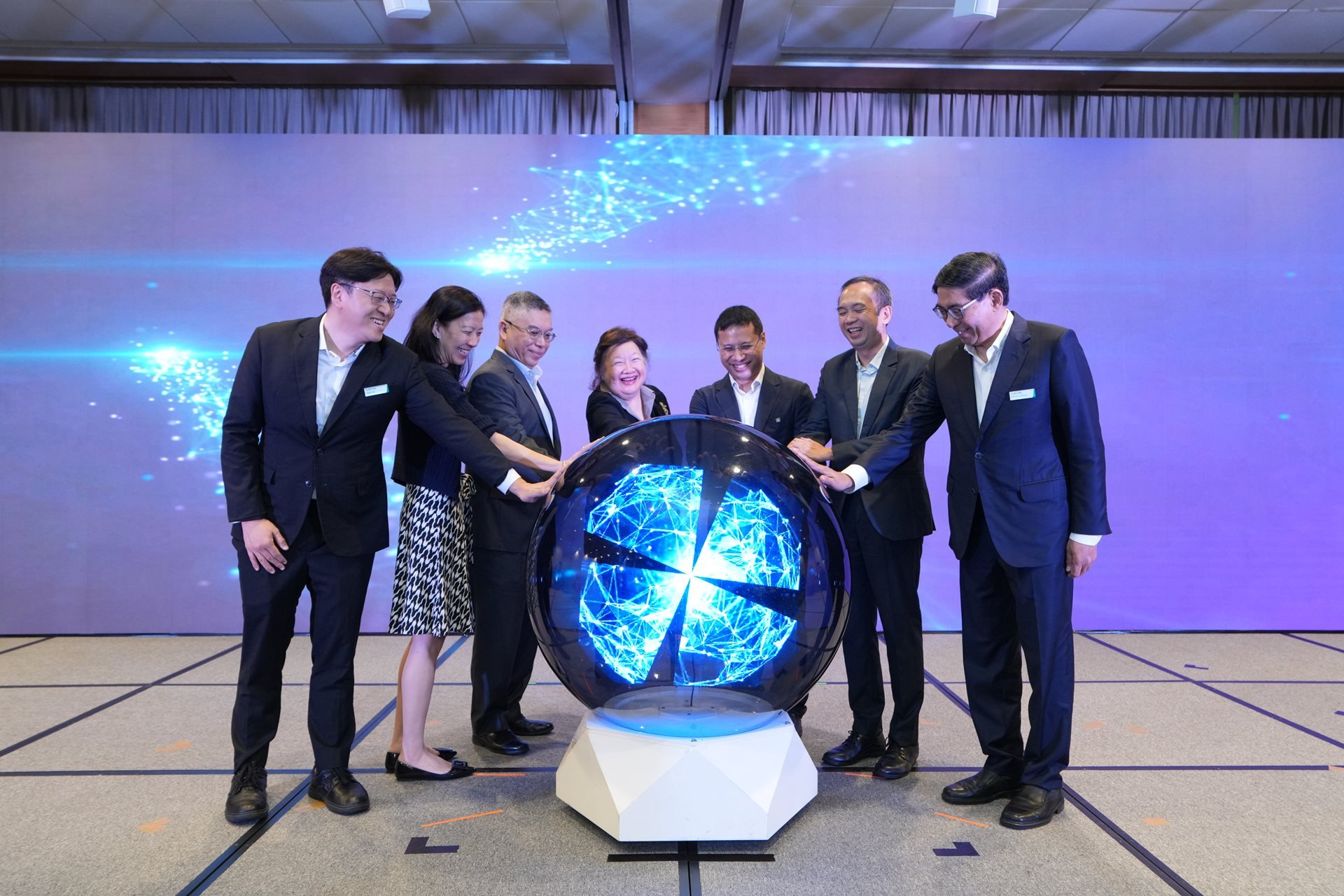In a world where industries are being reshaped by technology, globalisation, and demographic change, one fact stands out starkly: qualifications alone are no longer enough. Skills, the ability to do, to adapt, and to keep learning, are increasingly becoming the true currency of opportunity.
Singapore has long prized academic achievement, with its education system ranking among the best in the world. But as jobs evolve at breakneck speed, the link between credentials and capabilities is weakening. Many employers now struggle to find people with the right skills, even among those with respectable degrees. Workers, in turn, worry that their qualifications may not guarantee them a foothold in tomorrow’s labour market.
This is where the concept of a skills-first economy takes hold. Instead of the question, “What certificates do you have?”, hirers worldwide are starting to ask, “What can you do, and what can you learn to do next?” It is a subtle but radical shift. Embracing the shift is what could reshape the nation’s approach to human capital and ensure that Singaporeans remain resilient and competitive in a volatile world.
The launch of the Centre for Skills-First Practices (CSFP) in October 2025 by the Institute for Adult Learning (IAL) and SkillsFuture Singapore (SSG) is a milestone in Singapore’s endeavours to move to a skills-first approach that recognises skills and competencies as the primary currency for employment, career progression and organisational performance.
At the event, Minister for Education and Minister-in-Charge of Social Services Integration Mr Desmond Lee emphasised the need to establish a shared language of skills that is understood and widely adopted by employers, individuals, and training providers. “Through this common language of skills, our employers can better articulate their skills gaps, training providers can activate the supply of skills required and individuals can acquire these in-demand skills through appropriate training,” he said.
This vision is not about abandoning credentials. Rather, it is about ensuring that skills are visible, valued, and rewarded. For Singapore, a nation with limited natural resources, embedding skills-first practices could unlock a new source of competitive advantage: human capital agility.
What a skills-first economy would look like
Imagine a system where workforce planning and operation stem from a skills-first lens. Such a system does more than keep the economy competitive. It democratises opportunity. Workers who may not have had access to elite educational pathways can prove their worth through skills. Employers gain access to a wider pool of talent. Society, as a whole, benefits from stronger mobility, inclusivity, and resilience.

But how does a country engineer such a profound shift? Singapore is approaching this challenge systematically, with several building blocks already in place.
Engineering the shift
The Skills-First Readiness and Adoption Index, a first-of-its-kind global framework, co-developed by the CSFP and the Organisation for Economic Co-operation and Development (OECD) established a global benchmark that measures the readiness and adoption of skills-first practices at the national level based on three sub-indices — Skills-First Learning Ecosystem, Skills-First Talent Recognition, and Enabling Environment for skills-first approaches.
Singapore ranked 12th out of 30 countries in the inaugural index. This signals Singapore’s better than average international standing, even if there is room for improvement. For the shift to succeed, every stakeholder must act. Beyond setting the policy framework, government agencies must continue investing in data, tools, and platforms. The commitment to updating the Skills Framework dynamically, rather than leaving it static, is one such step. Policy levers such as standardising skills assessment, enhancing validation of alternative credentials, and advocating for employer trust in new frameworks will be crucial to accelerate adoption.
Businesses must see skills-first not as a compliance exercise but as a strategic advantage. Hiring by skills opens access to untapped talent pools; assessing staff by skills enables better deployment and retention. Companies like Grab, which allow employees to join cross-functional projects regardless of role, exemplify how latent skills can be unlocked.
Training providers need to shift from content-driven delivery to demand-driven, skills-targeted programmes. Leveraging the SSG’s Jobs-Skills dashboards, providers can update curricula more responsively, ensuring learners gain skills that match industry needs. Lastly, workers need to take charge of their “career health.” This means keeping skills visible through assets such as portfolios, digital badges, or Careers & Skills Passports and continually updating them.
New Memoranda of Understanding have been inked between CSFP and three entities — National Trades Union Congress, NHG Health, and Burning Glass Institute — to drive the adoption and study of skills-first practices, from redesigning healthcare roles to piloting compensation systems tied to skills proficiency.
As the strategic enabler for skills-first practices, CSFP will be developing more tools to help guide workforce development and inform policy decisions. One notable tool is the toolkit for Work Redesign for Skills-First Organisations, specifically to support the transformation of Singapore’s Small and medium Enterprises.

The Centre for Skills-First Practices: A Strategic Enabler
At the heart of this transformation is CSFP. Executive Director of IAL, Associate Professor Yeo Li Pheow, highlights its role, “With the launch of CSFP, IAL will work with partners to embed skills-first practices in the fabric of our workforce — shaping mindsets, aligning systems, scaling efforts, and building a shared ‘skills language’.”
The CSFP will convene stakeholders, drive research and analytics, develop indices and toolkits, and pilot practical initiatives. It is designed to be both a thought leader and an action enabler, ensuring that skills-first principles translate into tangible change on the ground.
Still, the hardest part may not be infrastructure or indices, but culture. New frameworks alone will not bring about the much-needed transformation. Deep-seated mindsets have to be challenged, among employers who must look beyond credentials, among workers who must keep investing in upskilling and reskilling, and among adult educators who must innovate continuously.
The launch of the CSFP is not the end point but the beginning of a journey. Mr Tan Kok Yam, Chief Executive of SSG emphasises, “For Singapore, this will be our catalyst to help every individual in navigating their upskilling journey and boosting their career health with confidence, knowing that their skills — however they were acquired — are recognised, valued, and can open doors to meaningful opportunities.”
A skills-first economy will not emerge overnight. It requires deliberate architecture, collective ownership, and cultural transformation. With CSFP and its partners leading the charge, Singapore has a unique opportunity to make that language speak for every worker, and to show the world what a truly skills-first economy looks like.
Find out more about the Centre for Skills-First Practices here.

